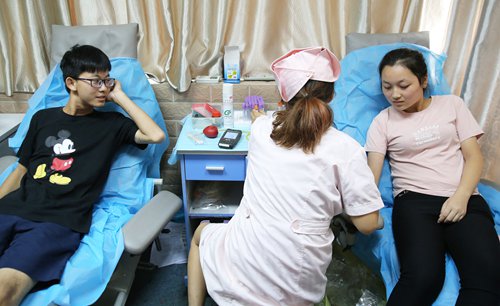Blood supply hits warning levels in various localities across China due to low temperature, surge in respiratory diseases

Due to continuous rain and snow combined with drastic temperature drops, and a peak in respiratory diseases, the number of blood donors has significantly decreased in multiple cities across China, posing a challenge for blood banks in ensuring sufficient blood supply in a number of localities.
The central blood station in Yuncheng, North China's Shanxi Province, which accommodates more than 4.7 million people, issued an appeal on Friday calling on residents aged between 18 and 55 to actively donate blood, as the city needs at least 220 voluntary blood donations per day to meet basic clinical demand.
The appeal noted that because of the recent rainy and snowy weather, as well as the high incidence of respiratory diseases, the number of blood donations in the city has significantly dropped and many blood banks are facing emergency levels when it comes to blood supplies.
Yuncheng is not alone in facing a shortfall in blood donors. The Global Times reached the central blood stations in Wuxi, East China's Jiangsu Province, as well as Ningbo in East China's Zhejiang Province, on Monday and both confirmed that local blood banks are experiencing a shortage of inventory.
The Wuxi blood station told the Global Times that due to the current shortage, hospitals are implementing blood control measures to ensure proper distribution.
The central blood station in Weifang, a city in East China's Shandong Province, is also under pressure. It too has appealed to the public, saying that it needs a minimum of 400 blood donations per day to meet clinical demand, including for patients suffering from traumatic bleeding, postpartum hemorrhages, burns, surgical procedures and other situations.
Winter is the peak season for cardiovascular and cerebrovascular diseases, which leads to a surge in clinical demand for blood. Another populous city in China, Xinxiang in Central China's Henan Province, called for urgent support after the city's blood inventory fell below a designated warning line, which local officials said severely impacts the ability to provide proper medical treatment to clinical patients and poses a threat to public health.
Based on media reports, at least six other localities across China have issued similar notices to call attention to the issue.
To cope with the situation, various localities have come up with a number of promotional activities to attract voluntary donors. The Shanghai central blood station told the Global Times on Monday that it has introduced different kinds of promotions on its WeChat account and official website, and is offering volunteer certificates as well as medals to encourage the good deed.
Since 1998, when the Law of the People's Republic of China on Blood Donation was officially implemented, the number of voluntary blood donations has continuously increased for over 20 years, according to data from the National Health Commission.
The number of voluntary blood donations nationwide has increased by roughly 47 times, from 328,000 in 1998 to more than 15 million in 2020. The blood donation rate per thousand people has also increased from 4.8 in 1998 to 11.1 in 2020.
A WHO global blood safety report shows that China ranks among the top in the world in terms of voluntary blood donations, blood safety and clinical blood use.
However, there is still a persistent shortage of blood in China. For one thing, although the blood donation rate has been on the rise year by year, it is still relatively low compared to developed countries, which stands approximately at 33 per thousand. On the other hand, there has been a fast growing need for blood across China, which has led to a widening gap between supply and demand, according to media reports.
Against this backdrop, a number of institutions have sought to turn what was originally supposed to be a voluntary act of public welfare into a compulsory requirements, which sparked huge controversy among the Chinese public.
According to media reports, a school in Jinhua, East China's Zhejiang Province, recently issued a notice stating that non-local residents wishing to enroll their children in local primary schools must adhere to a points-based system. Apart from accumulating higher points based on the duration of residency, they can also gain points through voluntary blood donations. Each 100ml donation earns 2 points, with a maximum of 30 points achievable through blood donation.
The decision to include blood donations as a criterion for "entry points" into schools has triggered controversy, with many arguing that this approach lacks rationale, turning voluntary blood donation into a utilitarian tool. Moreover, it pressures non-local residents to donate blood for their children's schooling, disregarding that not everyone is suitable to give blood.